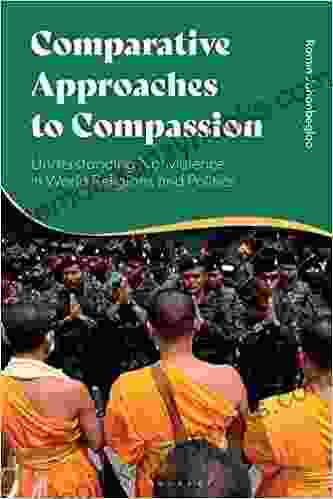Comparative Approaches to Compassion: Exploring the Diverse Perspectives of World Religions and Philosophies

Compassion, the profound sentiment of empathetic concern for the well-being of others, transcends cultural and religious boundaries, uniting individuals across diverse traditions and belief systems. This comprehensive article delves into the intricate tapestry of comparative approaches to compassion, shedding light on the multifaceted interpretations and expressions of this fundamental human quality.
Compassion in World Religions
Buddhism:
Buddhism emphasizes the cultivation of compassion as a path to enlightenment. The central concept of "bodhicitta" embodies the aspiration to attain Buddhahood solely for the purpose of benefiting all sentient beings. Through practices such as meditation and mindfulness, Buddhists strive to develop boundless compassion, extending it to all creatures without distinction.
5 out of 5
| Language | : | English |
| File size | : | 2627 KB |
| Text-to-Speech | : | Enabled |
| Screen Reader | : | Supported |
| Enhanced typesetting | : | Enabled |
| Word Wise | : | Enabled |
| Print length | : | 169 pages |
Christianity:
In Christianity, compassion is a divine attribute, exemplified by the life and teachings of Jesus Christ. The commandment to "love thy neighbor as thyself" encapsulates the essence of Christian compassion, urging individuals to treat others with empathy, understanding, and selflessness.
Islam:
Compassion holds a central position in Islamic teachings, often intertwined with the concepts of mercy and forgiveness. The Holy Quran enjoins Muslims to "show compassion to the orphans and the needy," and the Prophet Muhammad is revered as a model of empathy and kindness.
Hinduism:
Hinduism places great emphasis on compassion, known as "karuna." The concept of "ahimsa" (non-violence) extends compassion not only to humans but also to all forms of life. The practice of "karma yoga" encourages individuals to engage in selfless service as a means of cultivating compassion.
Confucianism:
Confucianism emphasizes the importance of "ren," often translated as "humaneness" or "benevolence." This ethical principle extends beyond personal relationships to encompass society as a whole, encouraging individuals to treat others with compassion and respect.
Philosophical Perspectives on Compassion
Aristotle:
Aristotle, the ancient Greek philosopher, regarded compassion as a fundamental human virtue, closely associated with empathy and sympathy. He believed that compassion motivates individuals to alleviate the suffering of others and promote their well-being.
Kant:
Immanuel Kant, the Prussian philosopher, distinguished between sympathy and compassion. While sympathy is an involuntary emotional response, Kant argued that true compassion is grounded in a moral imperative to treat others with dignity and respect, regardless of personal emotions.
Schopenhauer:
Arthur Schopenhauer, the German philosopher, believed that compassion arises from a deep understanding of the interconnectedness of all living beings. He argued that only by recognizing the suffering of others as one's own can true compassion be cultivated.
Nietzsche:
Friedrich Nietzsche, the German philosopher, held a complex and often controversial view of compassion. While acknowledging the importance of empathy, he cautioned against excessive pity, which he believed could weaken individuals and undermine their own well-being.
Comparative Analysis
Despite the multifaceted expressions of compassion across traditions and philosophies, certain common themes emerge upon closer examination.
Empathy and Understanding:
Across diverse perspectives, compassion is rooted in the ability to empathize with the suffering of others. It entails an understanding of their needs, perspectives, and emotions.
Altruistic Motivation:
Compassion is primarily motivated by a desire to alleviate the suffering of others, without seeking personal gain or recognition. It is an act of selflessness and generosity.
Universality:
Compassion is a universal human capacity, transcending cultural, religious, and ideological boundaries. It is a fundamental aspect of human nature that can be cultivated through various means.
Practical Expressions:
Compassion manifests itself in a wide range of practical expressions, from acts of kindness and support to social activism and charitable endeavors. It extends to individuals, communities, and the natural environment.
Comparative approaches to compassion offer valuable insights into the diverse ways in which this fundamental human quality is understood and expressed across world religions and philosophies. By exploring the nuances and commonalities of these perspectives, we gain a deeper appreciation for the power of compassion to bridge divides, foster understanding, and create a more compassionate world.
Remember, compassion is not a passive sentiment but an active force that propels individuals to make a positive impact on the lives of others. As we continue to foster compassion in ourselves and our communities, we pave the way towards a more just, equitable, and harmonious society.
5 out of 5
| Language | : | English |
| File size | : | 2627 KB |
| Text-to-Speech | : | Enabled |
| Screen Reader | : | Supported |
| Enhanced typesetting | : | Enabled |
| Word Wise | : | Enabled |
| Print length | : | 169 pages |
Do you want to contribute by writing guest posts on this blog?
Please contact us and send us a resume of previous articles that you have written.
 Book
Book Novel
Novel Page
Page Chapter
Chapter Text
Text Story
Story Genre
Genre Reader
Reader Library
Library Paperback
Paperback E-book
E-book Magazine
Magazine Newspaper
Newspaper Paragraph
Paragraph Sentence
Sentence Bookmark
Bookmark Shelf
Shelf Glossary
Glossary Bibliography
Bibliography Foreword
Foreword Preface
Preface Synopsis
Synopsis Annotation
Annotation Footnote
Footnote Manuscript
Manuscript Scroll
Scroll Codex
Codex Tome
Tome Bestseller
Bestseller Classics
Classics Library card
Library card Narrative
Narrative Biography
Biography Autobiography
Autobiography Memoir
Memoir Reference
Reference Encyclopedia
Encyclopedia Kaitlyn Pitts
Kaitlyn Pitts Laura Town
Laura Town Patricia Wells
Patricia Wells Mirra Reddy
Mirra Reddy Anas Sb Publishing
Anas Sb Publishing Yummy Kitchen
Yummy Kitchen Linda Gassenheimer
Linda Gassenheimer Jean Pierre Filiu
Jean Pierre Filiu Amba Gale
Amba Gale Amy Johnson
Amy Johnson Amy Ludwig Vanderwater
Amy Ludwig Vanderwater America Hebe
America Hebe Amy Sands
Amy Sands Brad Schepp
Brad Schepp Nathaniel
Nathaniel Andrea S
Andrea S Kimberly A Tessmer
Kimberly A Tessmer R J Anderson
R J Anderson Daniel M Russell
Daniel M Russell Amy Ferris
Amy Ferris
Light bulbAdvertise smarter! Our strategic ad space ensures maximum exposure. Reserve your spot today!

 Richard SimmonsThe Best Guide for Beginners: Learn How to Gain Followers and Become an...
Richard SimmonsThe Best Guide for Beginners: Learn How to Gain Followers and Become an...
 Leo TolstoyDiving into Theoretical Acupuncture: A Comprehensive Review of Patricia May's...
Leo TolstoyDiving into Theoretical Acupuncture: A Comprehensive Review of Patricia May's...
 Dave SimmonsEssential Role of Rare Vitamin in Preventing and Reversing Bone, Heart, and...
Dave SimmonsEssential Role of Rare Vitamin in Preventing and Reversing Bone, Heart, and... Oscar WildeFollow ·7.6k
Oscar WildeFollow ·7.6k Dale MitchellFollow ·9.6k
Dale MitchellFollow ·9.6k Avery SimmonsFollow ·18.1k
Avery SimmonsFollow ·18.1k Jean BlairFollow ·16.7k
Jean BlairFollow ·16.7k David Foster WallaceFollow ·17.5k
David Foster WallaceFollow ·17.5k Ernest J. GainesFollow ·16.2k
Ernest J. GainesFollow ·16.2k Thomas HardyFollow ·2.3k
Thomas HardyFollow ·2.3k Cade SimmonsFollow ·8.2k
Cade SimmonsFollow ·8.2k

 Miguel Nelson
Miguel NelsonFour Cookbooks In One: Recipes To Fight Cancer, Heart...
Looking for a healthy way...

 Marcus Bell
Marcus BellHearts and Souls: Exploring the Lives and Legacies of...
The Special Olympics movement has been a...

 Tony Carter
Tony CarterDiagnosed With Breast Cancer: Navigating Life After the...
A breast cancer diagnosis can be a...

 Joe Simmons
Joe SimmonsLiddypool: The Stories and Interviews – A Literary...
In the realm of...

 Jett Powell
Jett PowellBreakfast for Boneheads: 66 Breakfast Recipes for Lazy...
Are you tired of eating the...
5 out of 5
| Language | : | English |
| File size | : | 2627 KB |
| Text-to-Speech | : | Enabled |
| Screen Reader | : | Supported |
| Enhanced typesetting | : | Enabled |
| Word Wise | : | Enabled |
| Print length | : | 169 pages |








